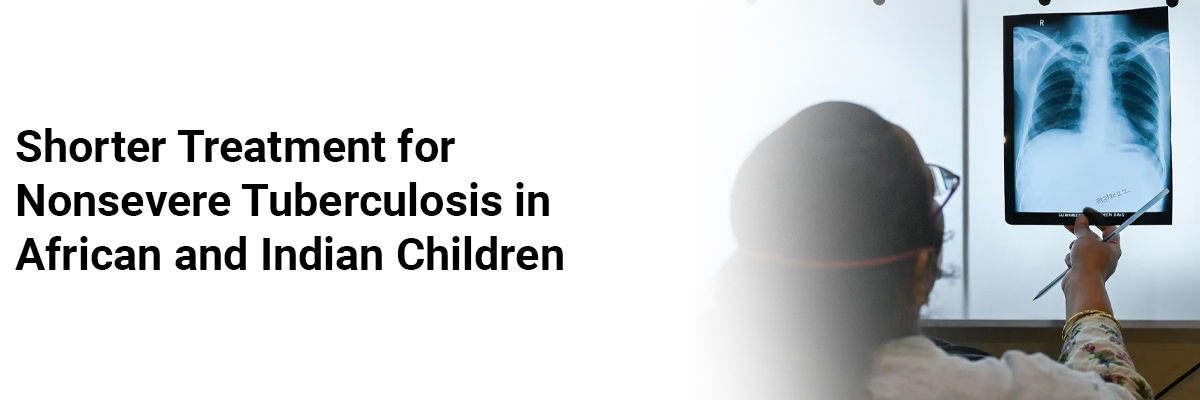
 IJCP Editorial Team
IJCP Editorial Team
Shorter Treatment for Nonsevere Tuberculosis in African and Indian Children
About two-thirds of children with tuberculosis have a nonsevere disease, which may be managed with a shorter regimen than the current 6-month regimen.
The present study enrolled children with nonsevere, symptomatic, presumably drug-susceptible, smear-negative tuberculosis in Uganda, Zambia, South Africa, and India. It randomized children younger than 16 years of age to 4 months (16 weeks) or six months (24 weeks) of standard first-line antituberculosis treatment with pediatric fixed-dose combinations as per the World Health Organization guidelines.
The study looked for unfavorable status (composite of treatment failure [extension, change, or restart of treatment or tuberculosis recurrence], loss of follow-up, or death) by 72 weeks and excluded the participants who did not complete four months of treatment (modified intention-to-treat population). It also assessed safety as an adverse event of grade 3 or higher during treatment and up to 30 days after treatment.
The study observed-
- Randomization of 1204 children (602 in each group).
- The median age of the participants was 3.5 years (range, two months to 15 years), with 52% being male, 11% containing human immunodeficiency virus infection, and 14% suffering bacteriologically confirmed tuberculosis.
- Retention by 72 weeks was 95%, and adherence to the assigned treatment was 94%.
- 3% of participants in the 4-month group had a primary-outcome event, similar to 3% in the 6-month group.
- Including only 80% of participants who were independently adjudicated to have tuberculosis at baseline, the intention-to-treat, per-protocol, and key secondary analyses all showed noninferiority for four months of treatment.
- 8% of participants experienced an adverse event of grade 3 or higher, including 15 adverse drug reactions (11 hepatic events, 9 of which occurred within the first eight weeks, when the treatments were the same in the two groups).
This study proves the noninferiority of four months of antituberculosis treatment to 6 months in children with drug-susceptible, nonsevere, smear-negative tuberculosis.
Turkova A, Wills GH, Wobudeya E, Chabala C. Shorter Treatment for Nonsevere Tuberculosis in African and Indian Children. N Engl J Med 2022; 386:911-922. DOI: 10.1056/NEJMoa2104535

IJCP Editorial Team
Comprising seasoned professionals and experts from the medical field, the IJCP editorial team is dedicated to delivering timely and accurate content and thriving to provide attention-grabbing information for the readers. What sets them apart are their diverse expertise, spanning academia, research, and clinical practice, and their dedication to upholding the highest standards of quality and integrity. With a wealth of experience and a commitment to excellence, the IJCP editorial team strives to provide valuable perspectives, the latest trends, and in-depth analyses across various medical domains, all in a way that keeps you interested and engaged.





















Please login to comment on this article